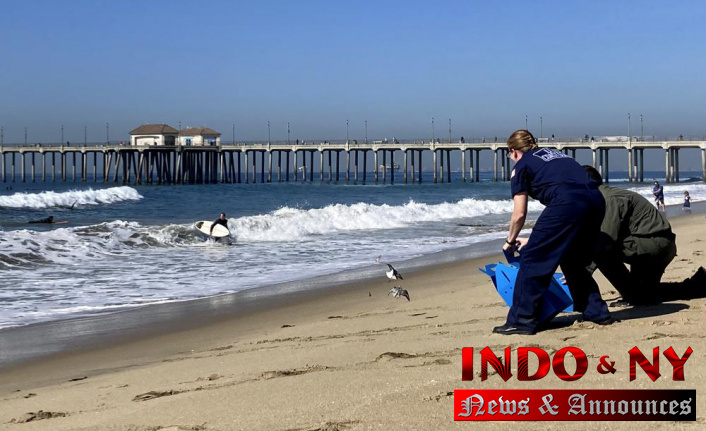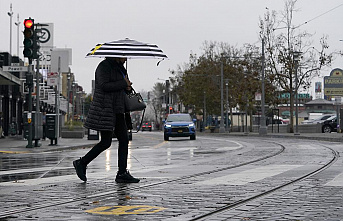According to an Orange County Sheriff's Department memo, Wednesday's Associated Press received initial reports that there was a spillage north of Huntington Beach pier. According to the documents, there were several similar calls from boats that left Huntington Beach's marine radio emergency channel.
According to the memo obtained under the California Public Records Act, the department that runs the county's harbor patrol sent a fireboat out to search for the spillage. However, the crew lost visibility due to darkness falling. The spillage was not confirmed until Saturday morning at 9:59 a.m.
The Coast Guard didn't immediately respond to the documents. These documents raise questions about the agency’s response to a spillage that caused the closure of many of the region’s most iconic beaches, and endangered animal and plant life.
Cottie Petrie–Norris is the chair of a state legislative panel looking into the spillage. She said that she was informed the spillage was reported Friday night, when it was too dark to detect.
She said, "It seems crazy that in a world where man is trying to send a man on Mars, we can't inspect an oil slick in darkness,"
Miyoko Sakashita is an attorney for the Center for Biological Diversity. She said that the Coast Guard should have responded faster to initial reports.
Sakashita said that an investigation should have been immediately conducted, which could have greatly reduced the scale of the spillage. Sakashita's organization has called for the federal government not to allow offshore oil drilling. "You should be able triangulate from all the reports that there is something that requires investigation immediately."
Before the sheriff's office documents were released, it was believed that the Coast Guard received the first report of a possible spillage at 6:13 pm on Oct. 1. It was from a foreign vessel anchored off Huntington Beach. The ship reported a sheen that extended more than 2 miles (3 km) across the water.
Rear Adm. Brian Penoyer had previously stated to the AP that the Coast Guard broadcast a radio message to vessels in the region and oil platforms seeking reports confirming a spillage. However, Capt Rebecca Ore (the unified response commander) said that no such broadcasts were made.
Coast Guard officials stated that they need to investigate what, if any, was done at that time but repeatedly refused to answer questions about the broadcast.
Penoyer stated that the Coast Guard didn't send a boat out in search of the spillage because the area was too dark and the technology wasn't available. According to the Orange County Sheriff's Department's report, the Coast Guard requested that Harbor Patrol dispatch a boat.
The Coast Guard called the Harbor Patrol again the next morning. Its hazardous materials investigators were sent out on a county fireboat. The memo stated that authorities on the boat found a black plume many miles offshore.
Kim Carr, Huntington Beach Mayor, said that it is not clear that an earlier notice would have made any difference.
She said, "Hindsight's 20-20." Carr said that if she had known about the 5:30 p.m. incident, it would have raised the initial notice of a potential spillage at 9:09 a.m. on the next day.
Federal investigators are investigating whether MSC DANIT, the Panama-registered container ship of 1,200 feet (366 meters) length, pulled anchor during a Jan. 25 storm, and then snagged the pipeline, before dragging it onto the seabed. Eight months later, it is unknown why the leakage occurred. Authorities are investigating whether any other anchors were used to weaken the pipeline, or if there was a preexisting condition.
Amplify Energy, a Houston-based company, owns and manages the pipeline that transports oil from its three offshore platforms. It is currently being inspected for the condition of the pipeline and whether it responded quickly enough to the spillage.
According to the Coast Guard, approximately 25,000 gallons (94.635 liters of oil) were spilled in Orange County. Oil and tar balls werehed ashore, causing a week-long closure of beaches. This caused severe disruption to the local economy and killed dozens of birds. Although the environmental advocates claim that the damage was much less than initially thought, the long-term effects on the wetlands and marine life are unknown.
Pete Stauffer is the Surfrider Foundation's environmental director. He said that a quick response to any spillage is crucial to limiting the damage.
Stauffer stated, "When there is a report of an oil slick in the ocean, it is important to investigate." It is crucial to know what happens within the first hour and days after an oil spillage.
Officials are now focusing on the cleanup of some areas as the conditions have improved over the past three weeks. According to California Fish and Wildlife Lieutenant Christian Corbo, tar balls are still being spread further south in San Diego County. However, cleanup efforts in some parts of Orange County may soon be complete.
The Oiled Wildlife Care Network director Dr. Michael Ziccardi said that workers are reducing their efforts to search the coast for oily wildlife. However, they will continue to respond the public's reports of oiled birds. Six of the six birds that had been oiled were released along the shoreline on Wednesday, while six more are being cared for.
A group of environmental groups demanded Wednesday that the Biden administration cancel all oil and gas leases in federal waters near the California coast. A petition was filed by the Center for Biological Diversity along with about 30 other organizations to the Department of the Interior arguing that it has the power to terminate these leases. It also argued that the platforms off the California coast, which are decades old, are particularly vulnerable to problems.
The Department of the Interior did not respond to the petition.












